Community “comes out,” celebrates diversity
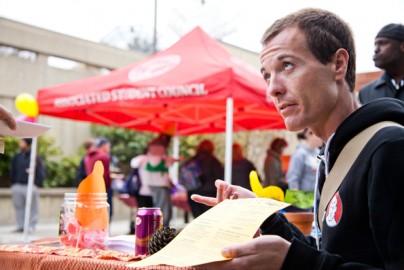
Lady Gaga’s quintessential lyric, “Baby, I was born this way,” played in the plaza outside the creative arts extension building during National Coming Out Day, an annual celebration to raise awareness about the lesbian, gay, bi-sexual, and transgender community through pride.Curious passers-by, openly gay Student Trustee William Walker and LGBT students and staff convened Oct. 11 for hamburgers and hot dogs for City College’s only celebration of the event.
Some people in the LGBT community feel that coming out is a stigmatized process complicated by homophobia but this day makes a case for pride—which is a representation of an individual’s passion and loyalty. It can be embodied through patriotism, cult-like sports fanaticism, heritage and genetic makeup.
“Our event is to foster a community environment and be supportive to people who want to make the commitment of coming out today,” Nicolette Gullickson, a Queer Resource Center staff member, said.
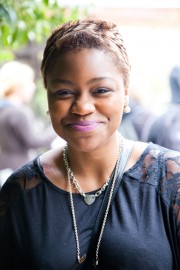
Around half a dozen groups set up tables to educate City College about issues within the LGBT community.
Tweaker.org promoted literature about crystal methamphetamine abuse.
“We’re here because we know that gay guys use crystal meth,” according to their website.
Two tables advocated for reducing LGBT stigma in the black community.
Now celebrated annually across the nation, this day of action began 25 years ago amid the emerging AIDS crisis.
The event was originally called the National March on Washington for Lesbian and Gay Rights.
Fueled by the perceived silence of the Reagan administration toward the AIDS epidemic and the Supreme Court’s criminalization of gay sex between consenting adults in private, thousands of assembled on Oct. 11, 1987, in Washington, D.C., to demand equality and civil rights.
The AIDS Memorial Quilt by the NAMES Project Foundation made its public debut on the day of the national march. The quilt was conceived by San Francisco gay activist Cleve Jones.
In 1988, the date of the march was recognized as National Coming Out Day. Oct. 11 was designated as such by Dr. Rob Eichberg, a psychologist, and Jean O’ Leary, a leader of several feminist organizations and a political consultant.
What’s Your Story?
From strife to support, rainbow of experiences
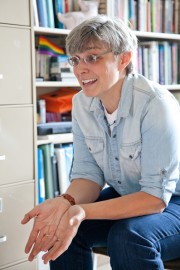
Jennifer Carlin-Dawgert, 47
Psychology Instructor at City College
Carlin-Dawgert knew from a young age she was different.
“I didn’t know what gay was at the time but I was pretty clear in kindergarten that something was different about me,” Carlin-Dawgert said.
When she played house, she liked to “kiss the mom” when she played the dad.
“I got to come home and the girls would let me kiss them and this was the best thing ever,” Carlin-Dawgert said.
Later in life, Carlin-Dawgert was in relationships with several men. She was engaged at one point, but came to terms with her sexuality in a dramatic realization.
“I was drinking a whole lot to make this (relationship) work, and I literally woke up and thought, ‘If I stay in this life I’m going to die,’” Carlin-Dawgert said.
After the break-up, she had a revelation about her sexuality during a Buddhist retreat. Her coming out was in a swift, self-actualizing way.
“I immediately knew that (being closeted) was what the problem was in my life,” Carlin-Dawgert said.
Aside from one or more members of her extended family, Carlin’s coming out was met with acceptance.
“It was a ‘What took you so long?’ kind of thing,” she said.
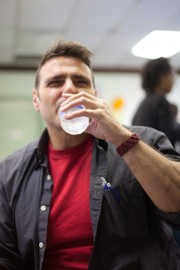
Fred Teti, 47
Math instructor
“I came out in Berkeley and it wasn’t a big deal,” Teti said. “I told (close friends) ‘I’m gay’ and they weren’t surprised.
“I’m on good terms with my family, but we don’t talk about it,” Teti said. “It’s not an issue. They haven’t disowned me and didn’t throw me out. Even on the occasion that I bring someone home to meet them, they’re cordial and civil.”
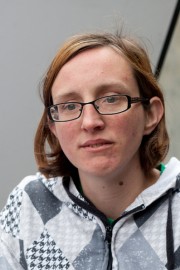
Loni Carter, 28
Gender studies major
“I had an awesome, openly gay teacher that served as a support system while I was struggling with coming out and my feelings,” Carter said.
She lost a few friends after coming out, but wasn’t upset for too long.
“It was tough at first,” Carter said. “But I’ve made better friends and started getting more involved in the community and really found a passion for it.”
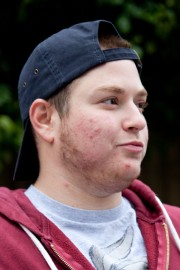
Darren Girard, 25
Physics major
“I was 17 and I was lucky enough to come out in a high school where it was OK to be gay,” Girard said. “Unfortunately, the community I lived in wasn’t, so that was kind of hard.”
Coming out to his parents was met with with mixed reactions.
“My mom wasn’t good with it, but my dad was because he has a gay sister,” Girard said. “My brother actually outed me to my mom, and it took her about five years to get over it, but she’s alright with it now.”

Comments are closed.